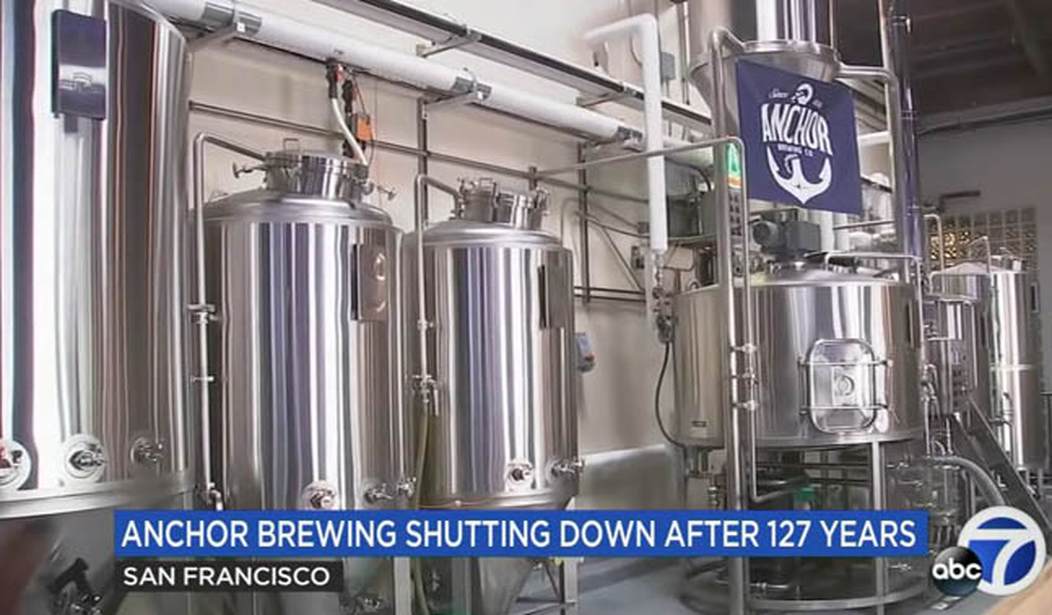Another business closing its doors in San Francisco but this one isn’t just another major chain retailer. Anchor brewing opened its doors in San Francisco in 1896 and has survived everything that happened between now and then. But today the company announced it had already brewed its last beer, citing economic problems related to the pandemic.
After 127 years in business, San Francisco’s Anchor Brewing Company is shutting down.
According to a press release, the brewery has been facing challenging economic factors and declining sales since 2016.
“This was an extremely difficult decision that Anchor reached only after many months of careful evaluation,” Anchor Brewing spokesperson Sam Singer said. “We recognize the importance and historic significance of Anchor to San Francisco and to the craft brewing industry, but the impacts of the pandemic, inflation, especially in San Francisco, and a highly competitive market left the company with no option but to make this sad decision to cease operations.”
Anchor was already struggling even before the pandemic shut down all the bars. It was purchased in 2017 by Japanese brewer Sapporo and even then it was in trouble:
When Japanese beer giant Sapporo purchased Anchor in 2017, the company was already “in the red,” according to Singer, who said that revenue is down by two-thirds since 2016. The pandemic was especially challenging for the brewery, added Singer, as it typically sells most of its beer through bars and restaurants. The brewery attempted to expand its retail distribution but was “unable to break through in a big enough way,” he said.
Mission Local reports there was some flailing along the way with the brewery trying to shake its historic image and get with the times.
It now seems safe to say that a number of poor decisions were made by both Sapporo and Anchor’s prior ownership. The decision to chase market share — to, at one point, brew the ridiculous total of half-a-dozen different IPAs — was, in the end, self destructive; it was a “How do you do, fellow kids?”-moment. Anchor did not make enough headway with a new generation of beer drinkers, and, in the process, diluted and denigrated its established brand.
This misguided attempt to rebrand reached its apogee in 2021 with a disastrous remaking of the beer’s venerable livery. Gone were the hand-painted labels generations of San Franciscans grew up with in favor of a new color scheme of highlighter yellows and Jolly Rancher sour apple greens meant to “pop” on a supermarket shelf.
So there were a lot of problems here but one that barely gets mentioned is that Anchor unionized in 2019.
On Dec. 20, 2019, workers at Anchor Brewing Company, a venerable Bay Area icon that brewed its first beer for thirsty San Franciscans nearly four decades before the Golden Gate Bridge was built, gathered in the brewery to ratify their first-ever collective bargaining agreement. It was a union contract years in the making — the product of methodical organizing that began in 2018, followed by a contentious public drive and negotiations that spanned the entire 2019 calendar…
That workers at Anchor had successfully organized a union, won their drive and election, and ratified a contract — and did it all without getting summarily laid off or unceremoniously abandoned for a cheaper labor market elsewhere — was a signal that it could be done in other craft-oriented businesses.
The core of the unionization effort was around pay issues as one employee explained:
The raise structure in the contract is staggered, so we got part of our raise this year [2020], and part of it at the beginning of next year [2021]. Then it [will] continue to go up. So I think starting January, [average pay] will have gone up 20 to 25 percent [since the contract went into effect.]
[In a follow-up message, Machel provided more specific figures: The contract provides Anchor’s brewery workers with an across-the-board average raise of 21 percent over three years. For workers at the Public Taps, the bump is 28 percent.]
Most of these people weren’t making big salaries but I’m sure giving out 20% raises when the company was already in the red didn’t help the situation. But to be fair, it sounds like the decision to close the bars in 2020 did more damage than anything else. Hard to sell beer by the keg when all the bars are closed.








Join the conversation as a VIP Member